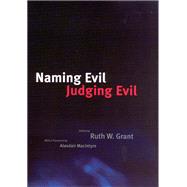
Note: Supplemental materials are not guaranteed with Rental or Used book purchases.
Purchase Benefits
Looking to rent a book? Rent Naming Evil, Judging Evil [ISBN: 9780226306735] for the semester, quarter, and short term or search our site for other textbooks by Grant, Ruth Weissbourd; MacIntyre, Alasdair C.. Renting a textbook can save you up to 90% from the cost of buying.
| Foreword Alasdair MacIntyre | |
| Preface | |
| Introduction | p. 1 |
| Speaking About Evil | |
| Where Did All the Evils Go? | |
| Seeing Darkness, Hearing Silence: Augustine's Account of Evil StanleyHauerwas | |
| The Rousseauan Revolution and the Problem of | |
| Inequality and the Problem of | |
| Making Judgments, Passing Judgment, Taking a Stand, Biting Your Tongue | |
| The Butler Did It | |
| Evil and the Morality of Conviction | |
| Combining Clarity and Complexity | |
| A Layered Approach to Cross-Cultural Ethics Elizabeth Kiss | |
| Liberal Dilemmas and Moral Judgment Malachi Hacohen | |
| Between Bigotry and Nihilism | |
| Moral Judgment in Pluralist Democracies | |
| Bibliography | |
| Index | |
| Table of Contents provided by Publisher. All Rights Reserved. |
The New copy of this book will include any supplemental materials advertised. Please check the title of the book to determine if it should include any access cards, study guides, lab manuals, CDs, etc.
The Used, Rental and eBook copies of this book are not guaranteed to include any supplemental materials. Typically, only the book itself is included. This is true even if the title states it includes any access cards, study guides, lab manuals, CDs, etc.